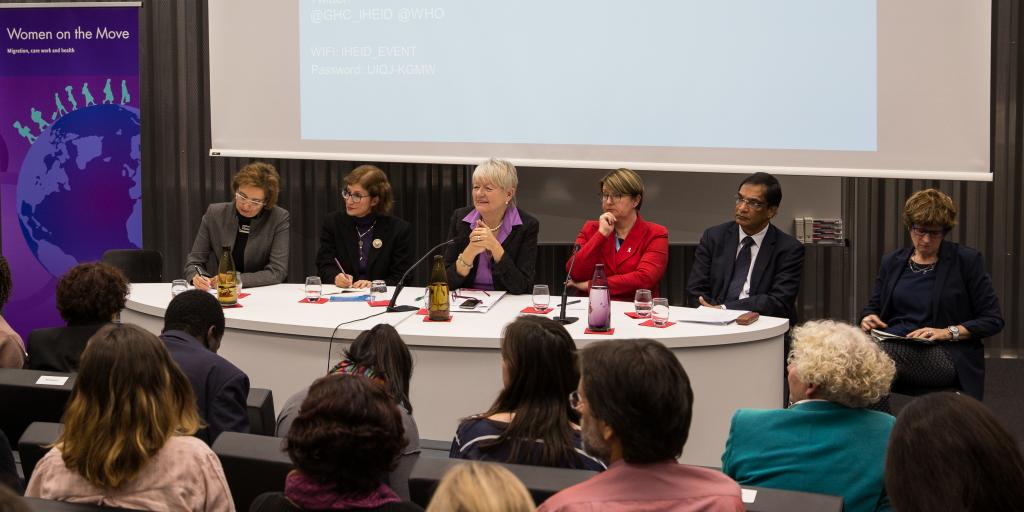An event was held at the Graduate Institute on 21 November to launch the World Health Organization’s (WHO) new report about migration, care work and health, Women on the Move. The new report breaks ground across disciplines – including health, employment, social protection, law, migration and citizenship – to put forth the state of evidence on migrant women care workers, the work they do and the lives they lead. While these women are contributing enormously to global public health, their work is rarely recognized, and they often cannot access health care or social services themselves.
An expert panel of country representatives and officials from international organizations commented on intersecting themes raised in the report. Speaking on behalf of WHO Director-General Dr Tedros, Assistant Director-General of External Relations Michele Boccoz said that “it is time that migrant care workers were treated as an asset, not as a liability,” while Ilona Kickbusch, Director of the Global Health Centre of the Graduate Institute, said that the launch of the report was “just the start of making these women visible.”
On behalf of WHO, Veronica Magar, Team leader of the Gender, Equity and Human Rights team at WHO, presented the key findings of the report, including what is known about the health situations of these women and the families they leave behind, the positive and negative sides to migration (including women’s economic empowerment in some cases and grave health risks in others), legal issues, and what countries need to do to improve the health and well-being of the migrant women care workers who are often responsible for propping up their very health systems.
Within the context of rising nationalism in global politics, the report makes the case for immigration as a benefit to countries and urges the recognition of care work as a global public good. Kate Gilmore, United Nations Deputy High Commissioner for Human Rights, said that despite the fact that “migration is a gift to the world…since the minute the first border was drawn,” there exists a “quadruple whammy” of discrimination against this group of migrant workers, based on rampant xenophobia, racism, sexism and the undervalued nature of care and domestic work.
Country representatives presented examples of steps that are already being taken to ensure the health and well-being of this population group. Antje Leendertse Ambassador of the Permanent Mission of the Federal Republic of Germany to the UN, spoke of the Triple Win Project, a programme to better ensure safe, decent and protected working conditions for Filipino health professionals who have come to work in Germany, most of whom are women. Alan Ludowyke, Director of International Health at the Ministry of Health, Nutrition and Indigenous Medicine of Sri Lanka, spoke of the country’s National Migration Health Policy that was set up to address the health issues of the 1.9 million migrants living outside of the country and the families they leave behind throughout the migration cycle. This includes guidelines for pre-departure health assessments and skill development programmes to improve health literacy and behavior. Hilda Davila, Director of International Relations at the Ministry of Health in Mexico, spoke of Ventanillas de Salud, an initiative set up in the 50 consulates of Mexico in the U.S., as well as 12 mobile units, whereby migrants can get information on health prevention and promotion, and referrals to community health centres regardless of their status in the country. “Women are the gatekeepers of health in a family,” said Davila, “so we have been directing and focusing our strategies towards contacting the women within migrant families.”
Moving forward, political leadership and vision is needed to promote intersectoral action to empower these migrant women and sustain change for equitable development. Making her first appearance representing WHO, Assistant Director-General of Family, Women, Children and Adolescents Dr Nono Simelela spoke of this challenge, saying that “the harder issue will be moving beyond the report and doing something on the ground.” Veronica Magar summed up the advocacy message behind the report, saying, “It is time to start thinking of care as a central concern for human life, health, well-being, comfort and cohesion…It is time that care-workers themselves are cared for.”
Useful resources
- Women on the Move, full report
- Women on the Move, policy brief
- Beyond the Barriers, report
- WHO's work on migration and health
Written for the GHC Newsletter by Claudia Quiros, Communications Consultant, and Mary Manandhar, Technical Officer, Gender - World Health Organization


